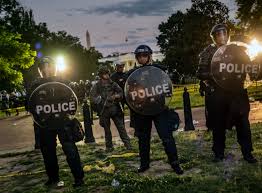In communities across the globe, the line between public safety and civil overreach is growing increasingly blurred. Over-policing—the excessive and often discriminatory deployment of law enforcement—has become a central issue in the modern justice debate.
While intended to maintain order, over-policing can erode trust, disproportionately target marginalized communities, and lead to systemic injustice. This article delves into the complex relationship between security and fairness, exploring how over-policing undermines the very justice it claims to uphold.
From traffic stops to surveillance-heavy neighborhoods, the quest for equitable treatment in law enforcement remains urgent and unresolved. As we examine real-world impacts and policy implications, we ask: Can justice truly thrive in a society where enforcement often outweighs empathy and equity?
Read More: Over-Policing and the Quest for Justice
Over-Policing and the Quest for Justice: A Greens Vision for Reform in NSW
Under successive Liberal-National governments, New South Wales has increasingly resembled a police state, plagued by a criminal justice system that disproportionately targets and penalises marginalised communities.
A punitive “law-and-order” agenda—compounded by anti-protest legislation—has emboldened police to intimidate and detain First Nations peoples, individuals with disabilities, peaceful protesters, and disadvantaged groups.
Children as young as 10 are arrested and incarcerated, denied the support they need in their communities and schools. Harsh bail laws and expanded police powers have led to the over-policing and mass incarceration of vulnerable populations.
NSW law enforcement and prison operators often evade accountability for misconduct, including deaths in custody. To end this cycle of injustice, we need independent, well-resourced oversight bodies capable of preventing abuse and ensuring those in custody are treated with dignity.
The Greens will end the practice of police investigating police and commit to the full implementation of the UN Optional Protocol to the Convention Against Torture (OPCAT).
Ending Criminalisation and Investing in Communities
The systemic criminalisation of marginalised groups, particularly First Nations peoples, must come to an end. The Greens propose a shift toward community-led alternatives to policing and incarceration.
This includes Justice Reinvestment, restorative justice, community courts, and rehabilitation and diversion programs that prioritise healing, support, and genuine accountability over punishment.
Our comprehensive plan includes:
- Repealing anti-protest laws and legislatively protecting the right to dissent
- Guaranteeing independent oversight of police and prison systems
- Raising the age of criminal responsibility to 14
- Fully implementing the recommendations of the Royal Commission into Aboriginal Deaths in Custody
- Ending the “law-and-order” auction and resisting policies that funnel more people into prisons
- Banning sniffer dogs and invasive strip searches
- We believe in building stronger, safer communities—not more prisons.
Protecting the Right to Protest
The increasing criminalisation of peaceful protest represents a direct threat to democracy. Throughout history, non-violent direct action has driven transformative change—from preserving The Rocks, to securing equal rights, fair wages, and environmental protections. Protest is not a public nuisance—it is a democratic necessity.
The Greens are committed to enshrining the right to protest in law, ensuring that peaceful activists are never imprisoned for exercising their democratic freedoms. Civic participation is a cornerstone of accountability and progress. We need more empowered citizens, not more silenced voices.
Reforming Prisons for Rehabilitation, Not Punishment
NSW prisons are failing. Rooted in outdated, punitive models, many correctional facilities do not meet basic human rights standards—some are literal remnants of the 19th century. For First Nations peoples, these environments are particularly dangerous.
With an incarceration rate above the national average and nearly 40% of individuals reoffending within 12 months, it’s clear the system is broken. The Greens will overhaul the prison system, prioritising rehabilitation, dignity, and community reintegration, and ensuring that imprisonment never equates to a loss of human rights.
Ending Over-Policing and Discriminatory Surveillance
Police powers in NSW have expanded without adequate checks and balances. Law enforcement is increasingly militarised, and marginalised communities bear the brunt of aggressive surveillance and intervention. Children as young as 10 can be strip-searched, often without cause. Meanwhile, only 2% of misconduct cases are independently investigated.
The Greens will:
- Ban sniffer dogs in public and community spaces
- End strip searches for anyone under 16
- Abolish general Suspect Target Management Plans (STMPs)
- Conduct a statewide review of police armament and begin demilitarisation
- Replace police with trained mental health responders in crisis situations
- These reforms are about creating real safety, rooted in trust and community care—not fear and coercion.
- Raising the Age: Treat Children Like Children
Globally, 14 is recognised as the minimum age of criminal responsibility. Yet in NSW, children as young as 10 are still subjected to the full force of the criminal justice system.
Unsurprisingly, First Nations youth comprise over half of those incarcerated—reflecting the deep, ongoing impacts of colonisation.The Greens will raise the age of criminal responsibility to 14, and ensure that no person under 16 is sent to prison in NSW.
We will replace punitive systems with trauma-informed, culturally appropriate responses that support rather than punish.
A Better Path Forward
Our justice system must serve all people, not just a privileged few. The Greens believe in fairness, accountability, and community wellbeing. Through these reforms, we will begin to heal the deep cracks in our justice system, end the cycle of criminalisation, and build a society where everyone—regardless of background—can live with dignity and safety.
Frequently Asked Questions (FAQs)
Why do the Greens say NSW has become a police state?
The Greens believe that under Liberal-National leadership, NSW has experienced a sharp increase in police powers, surveillance, and the criminalisation of marginalised groups. Peaceful protesters, First Nations people, children, and people with disabilities are disproportionately targeted. A lack of independent oversight means misconduct often goes unpunished, which undermines democratic accountability and civil liberties.
What is the Greens’ position on protest rights?
The Greens strongly support the right to peaceful protest as a fundamental component of a healthy democracy. They are committed to repealing anti-protest laws and enshrining the right to dissent in law so that activists are not criminalised for exercising their democratic freedoms.
What does “Raise the Age” mean and why is it important?
“Raise the Age” refers to increasing the minimum age of criminal responsibility from 10 to 14, aligning with international standards. The Greens argue that children should be supported through community, health, and education systems—not criminalised. They also advocate for banning prison sentences for anyone under the age of 16.
Why do the Greens want to end the use of sniffer dogs and strip searches?
These practices are seen as invasive, discriminatory, and largely ineffective. Sniffer dogs and strip searches disproportionately target young people and marginalised communities, often without yielding meaningful results. The Greens propose abolishing these practices in public spaces and banning strip searches on children under 16.
What is Justice Reinvestment and how does it work?
Justice Reinvestment is a community-led approach that redirects funds from prisons into programs that address the root causes of crime—such as housing, education, health, and employment. The goal is to reduce incarceration rates while improving outcomes for individuals and communities, particularly First Nations communities.
Conclusion
New South Wales stands at a crossroads. For too long, punitive policies, unchecked police powers, and a broken criminal justice system have disproportionately harmed First Nations people, children, peaceful protesters, and other marginalised communities.It’s time to chart a new course—one grounded in justice, dignity, and community care.






